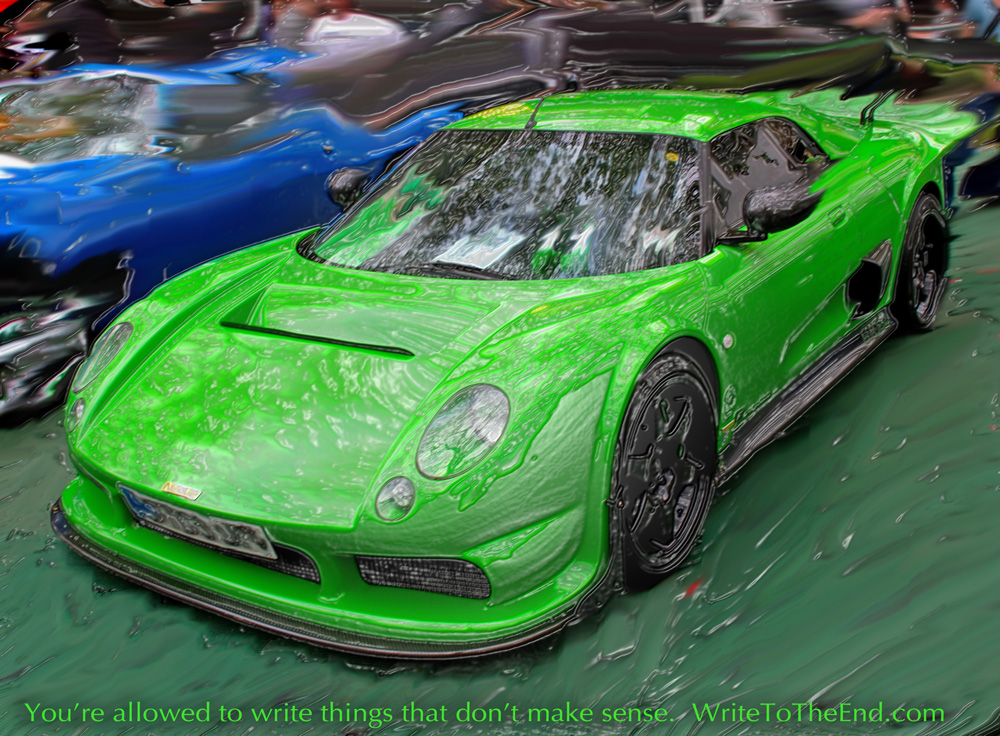
Syntax gives us the power to say things that don’t make sense: Ideas can’t have color (or crash a car), and something colorless can’t also be green, but I can say “colorless green ideas crashed my car,” and you can understand me, even if you’re quite not sure what I mean.
The structure of a story or other piece of writing gives us a similar power. You can write about something that no one has ever experienced, and people will experience it through your story. This is not what I mean, and it makes my introduction about syntax sound like an analogy, when I’m trying to say something profound about the magic of language.
Let me try again. If I break the syntax—“green a the car colorless my”—you might not be able to follow what I’m saying anymore. You might say this string of words makes even less sense than “colorless green ideas.” However, with enough structure of other sorts, even such unconventional syntax can create deep meaning. For example, e.e. cummings: “anyone lived in a pretty how town / (with up so floating many bells down).”
What I’m trying to say is, write anything. You can change things later if it turns out you need to. Natalie Goldberg uses the example, “I cut the daisy from my throat.” This doesn’t make sense, but people’s minds will make sense out of it, and it will come to have meaning based on the context. If I say that colorless green ideas crashed my car, you’re going to start forming hypotheses about how this can happen: Maybe the “ideas” are aliens, and they are transparent but also green. That’s not what I mean either! The mind makes meaning. If you use syntax, you can say anything, and our minds will create it, even if it doesn’t “make sense.” If you use story structure, you can say anything, too. Story structure has underlying “bones” the way language does.
Here’s what I mean: Meaning is not dependent on making sense. Meaning exists even in things that “don’t make sense” in a conventional way. Look at the e.e. cummings poem I quoted above. Read the whole thing. It “doesn’t make sense” (the syntax is crazy, the words are used in ways you’ve never seen before), but its meaning is there nonetheless. In fact, we could argue that its true meaning and effect are only possible because cummings breaks the syntax and does things in this unconventional way. I’m sure it took him a long time and many revisions to get that poem into its final state.
I’m giving two pieces of advice here, for two different parts of the writing process:
- When you’re writing your first draft, write anything. Don’t care if it doesn’t make sense. Keep going. Write until you get to the end, and save the editing for later. (If you need a process to help you do this, I recommend Natalie Goldberg’s writing practice, detailed in her book Writing Down the Bones.)
- If you’re editing a piece, and the effect you want to create requires breaking syntax or creating an unconventional story structure, or doing something else that “doesn’t make sense,” DO IT! Your loyalty is not to some idea of social or literary convention, but to the entity you are trying to bring to life. You can trust your reader as the co-creator of this entity. Work hard. Make your language and structure ever more precise until what “doesn’t make sense” means exactly what it needs to mean.
Very good advice Kieko. Thank you.
Love your comments. Very helpful.
Jan Petrucha. Xxxx
Thanks, Jan! I always appreciate your writing! 🙂